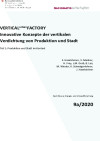Suchergebnisse
VERTICALurbanFACTORY: Innovative Konzepte der vertikalen Verdichtung von Produktion und Stadt

Das Projekt beforscht Möglichkeiten und Potenziale hocheffizienter Raumnutzung durch moderne Konzepte „gestapelter“ Funktionen und vertikaler Produktion.
Schriftenreihe
9/2020
E. Haselsteiner, V. Madner, H. Frey, L.M. Grob, B. Laa, M. Winder, K. Schwaigerlehner, J. Haselsteiner
Herausgeber: BMK
Deutsch, 253, 153 bzw. 52 Seiten
Downloads zur Publikation
SPRINKLE - Smart City Governanceprozesse in kleinen und mittleren Städten
Das Projekt "SPRINKLE" führte eine umfassende Untersuchung der Ansätze für die Koordination und Steuerung einer Smart City Entwicklung in kleineren und mittleren Städten durch. Dabei wurden im Rahmen von Fallstudien für ausgewählte energiebezogene städtische Handlungsfelder sowohl relevante rechtlich-institutionelle Rahmenbedingungen als auch Governance-Prozesse betrachtet.
PRoBateS - Potenziale im Raumordnungs- und Baurecht für energetisch nachhaltige Stadtstrukturen
Das Projekt hat das Ziel, Hemmnisse und Potenziale für energiepolitische Maßnahmen im Raumordnungs- und Baurecht zu analysieren und konkrete Handlungsempfehlungen für energetisch nachhaltige Stadtstrukturen zu erarbeiten. Das Projekt verknüpft dazu eine fundierte rechtswissenschaftliche Analyse mit einer raumstrukturellen und quantitativen Wirkungsabschätzung.
URSOLAR - Optimierung der SOLARenergienutzung in URbanen Energiesystemen
URSOLAR stellt EntscheidungsträgerInnen eine Roadmap zur integrierten urbanen Solarenergie-nutzung zur Verfügung. Es wird aufgezeigt, wie Photovoltaik (PV) und Solarthermie angepasst an infrastrukturelle und rechtliche Gegebenheiten in idealtypischen Stadtquartieren aus ökonomischer, ökologischer und sozialer Sicht sowie unter Berücksichtig von Stakeholder-Interessen optimal ge-nutzt werden können.
Workshop: Roadmap zur integrierten urbanen Solarenergienutzung
3. Oktober 2016
FH Joanneum, Alte Poststraße 154, 8020 Graz
Bei diesem Stakeholderworkshop wird der Entwurf der Roadmap zur integrierten urbanen Solarenergienutzung vorgestellt. Außerdem erhalten Sie als ExpertInnen die Möglichkeit sich in die Gestaltung der Roadmap einzubringen.
URSOLAR - Optimization of SOLAR energy usage in URban energy systems
URSOLAR provides decision makers with a roadmap for the integrated use of solar energy in urban environments. The roadmap shows, how photovoltaics- and solar-thermal installations can be used in an ecological, economical and socially optimal way whilst considering legal requirements as well as infrastructural conditions in typical city quartiers and stakeholder interests.
SPRINKLE - Smart city governance processes in small and medium-sized cities
The project aimed at comprehensively analyzing existing approaches for the coordination and regulation of Smart City development in small and medium-sized cities. In the context of case studies, this study combines the analysis of relevant legal-institutional frameworks as well as of governance processes for selected, energy-related fields of urban activity.
PRoBateS - Potentials of planning and building legislation for energetically sustainable city structures
The aims of this project are to analyse planning and building legislation in order to identify barriers, potentials and suitable courses of action for energy-orientated policy measures. Specific policy recommendations are developed with a view to increasing the sustainability of energy-related city structures. For these purposes the project combines two different disciplinary approaches: a thorough legal analysis and a spatial structure and quantitative impact assessment.
Smart.Monitor - SMART City Indikatoren- und MONITORing für Smart City Zielsetzungen - am Beispiel der "Smart City Wien Rahmenstrategie"
Erhebung der wesentlichen Grundlagen für die Konzeptionierung eines Monitorings und dessen Indikatoren im Bereich Smart City. Die Ergebnisse sollen zukünftig die Erstellung eines Smart City Monitorings unterstützen.
Smart.Monitor – SMART city indicators and MONITORing for smart city objectives – based on the example of the Smart City Vienna Framework Strategy
Elaborating and preparing the basic information and data required to conceptualize indicators and a monitoring system for the smart city framework strategy. The results shall support the future monitoring of the Smart City Vienna Framework Strategy.
Synergien Gestalten - Räumliche und energetische Transformationsszenarien für Kleinstädte und Gemeinden am Beispiel der Region Wagram (NÖ)
Ein interdisziplinäres Sondierungsprojekt, das Strategien zur Leerstandsaktivierung und das Potenzial zur Bildung kleinräumiger Energiegemeinschaften synergetisch betrachtet. Ausgangspunkt sind Studierendenprojekte des Instituts für Architektur und Entwerfen der TU Wien für vier Gemeinden in der Kleinregion Wagram. Auf dieser Basis entwickelt ein interdisziplinäres Expert:innenteam ein Konzept für einen Synergie-Cluster mit Fokus auf Energieraumplanung, Bauphysik, Kreislaufwirtschaft und soziale Innovation.
Designing Synergies. Spatial and Energetic Transformation Scenarios for Small Towns and Municipalities Using the Example of the Wagram Region (Lower Austria).
An interdisciplinary exploratory project that synergistically analyses strategies for the activation of vacant buildings and the potential for the formation of small-scale energy communities. The starting point is student projects from the Institute of Architecture and Design, TU Wien, for four municipalities in the Wagram region. On this basis, an interdisciplinary team of experts is developing a concept for a synergy cluster focussing on spatial energy planning, building physics, the circular economy and social innovation.
Bundesweite Steuerungsmatrix zur interinstitutionellen Abbildung, Optimierung und Förderung der räumlichen Planung und des Städtebau (BW STMX STB)
Entwicklung einer interaktiven "Steuerungsmatrix" zur bundesweiten Erfassung und Optimierung der Programme und Förderinstrumente der räumlichen Planung auf allen Maßstabsebenen. Die Matrix schafft Transparenz, ordnet bestehende Programme und Instrumente zueinander und ermöglicht so eine ressort- und institutionsübergreifende Zusammenschau, um Synergien zu nutzen und Lücken zu schließen.
RaumCoop 2.0 - Raum Cooperative, ein systematisches Betriebsmodell zur Aktivierung ungenutzter oder untergenutzter Räume
Die RaumCoop organisiert das Teilen von Räumen, mobilisiert untergenutzte Räume für Nicht-Wohnzwecke in der Erdgeschosszone und stellt diese zur temporären Nutzung zu leistbaren Bedingungen zur Verfügung. Ziel des Projekts ist der Aufbau dieser gemeinnützig wirtschaftenden Organisation.
RaumCoop 2.0 - Space Cooperative, a systematic operational model for activating unused or underutilized spaces.
The RaumCoop organizes the sharing of spaces, mobilizes underutilized spaces for non-residential purposes in the ground floor area, and makes them available for temporary use at affordable conditions. The goal of the project is to establish this non-profit organization.
LEIWAND - Lokale Entscheidungen für den sozial-ökologischen Infrastrukturwandel
Politisch-ökonomische Analyse von Entscheidungsprozessen zu Mobilität und Flächennutzung. Interessen unterschiedlicher Akteur:innen werden identifiziert und Vorschläge für bessere Entscheidungsfindung im Sinne einer sozial-ökologischen Transformation erarbeitet.
